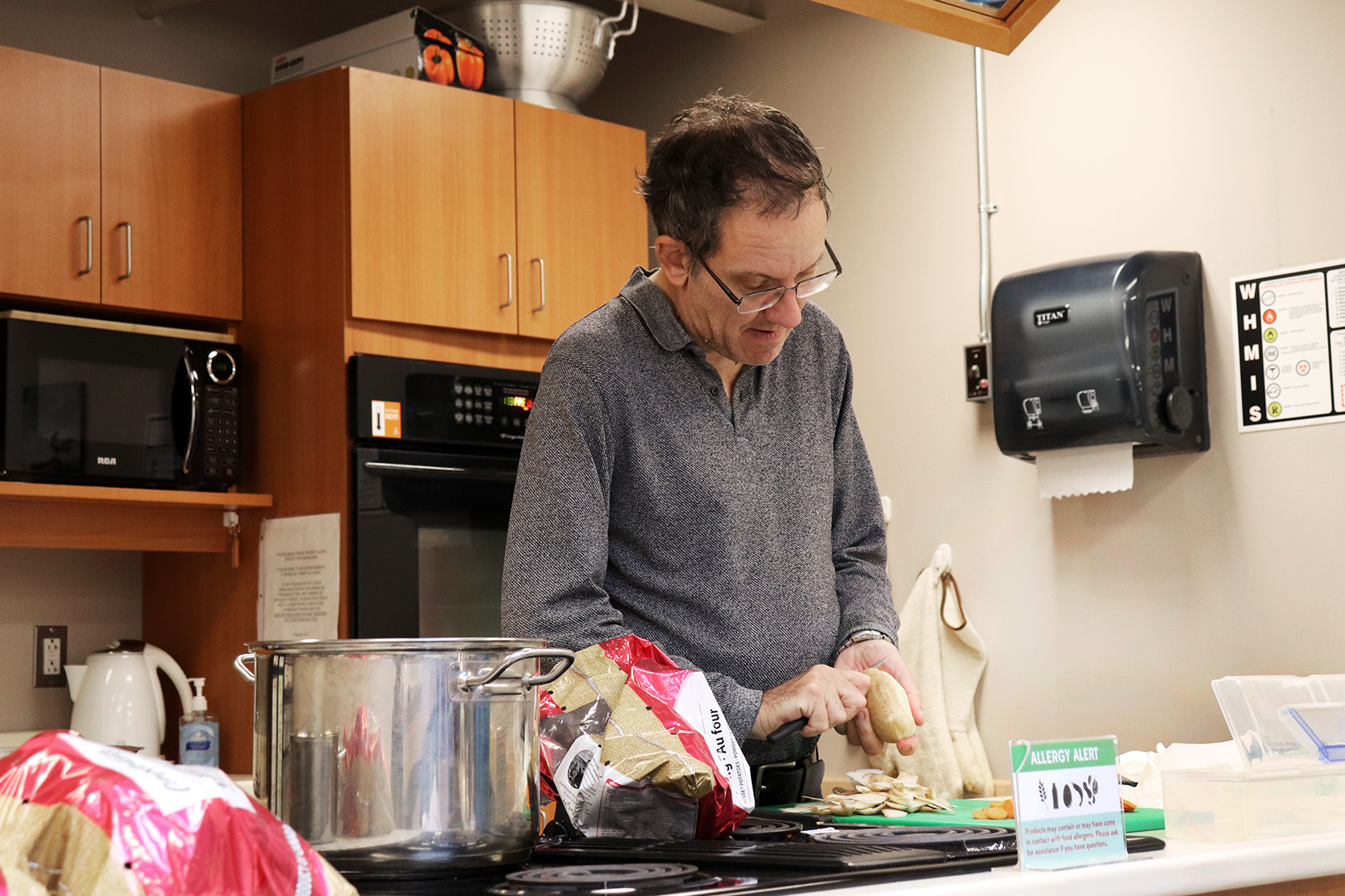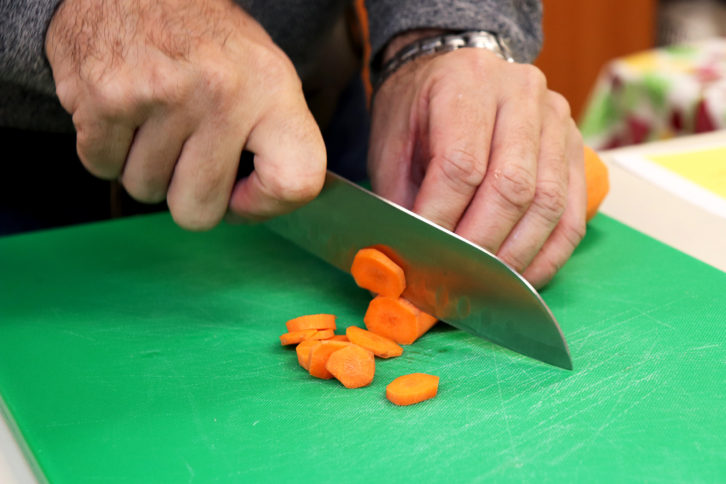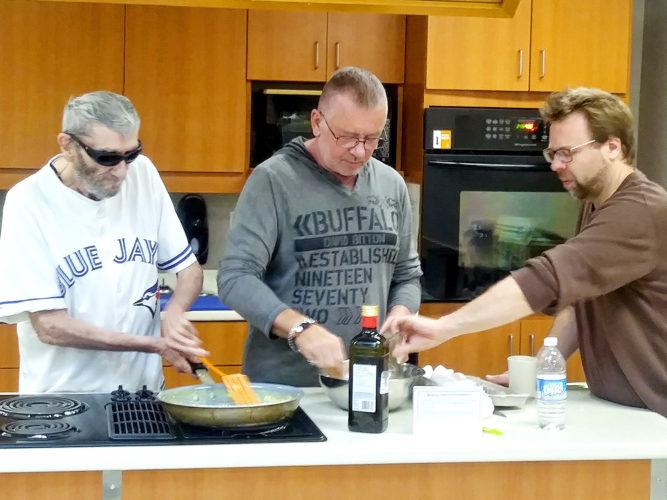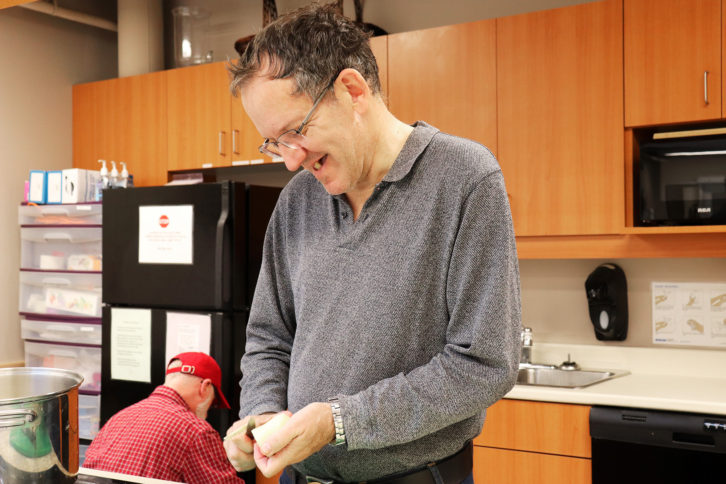Cooking course helps HIV-positive men fight isolation, food insecurity
Affordable Eats program 'should’ve come along 20 years ago'

caption
Daryl Mombourquette attended the cooking course for his partner.Daryl Mombourquette already knew how to cook when he signed up for a local cooking class last month.
But the class taught him about more than just preparing meals: it gave him a deeper understanding of his partner’s condition.
The new course, taught by the AIDS Coalition of Nova Scotia, teaches its students how to maintain a healthy, nutritional diet through waves of nausea and fatigue caused by HIV.
Mombourquette’s partner was diagnosed as HIV-positive 22 years ago. Last month, his partner suffered kidney failure on one side and two heart attacks. This has left him perpetually exhausted and unable to work. Related stories
Recently, Mombourquette said, they have relied on food banks. The cooking program has helped him make “something out of nothing.”
“It’s needed and should’ve come along 20 years ago,” said Mombourquette.
Making health affordable
ACNS’s Affordable Eats program is the first of its kind in Halifax. The first five-week beginners cooking course wrapped up Wednesday.
Organizer Lori O’Brien said many of the coalition’s members are beneath the poverty line and ACNS saw an opportunity to help them learn how to prepare healthy and affordable meals.
“We wanted to teach them basic cooking skills that they could carry over into their personal life,” said O’Brien. “Some people didn’t know how to boil water or cut an onion.”
A nutritionist and two nutrition students lent a helping hand. They taught the students the importance of high protein and high fat diets to combat HIV symptoms like exhaustion and muscle loss.

caption
On the fifth week, the class made cottage pie.Students learned that it’s more important to eat frequently and generously than to eat three meals a day. The course also taught students not to eat when they feel nauseated to avoid forming an association between food and illness.
Students cooked with ingredients from Manna for Health, a specialty food bank guided by the dietary needs of people living with HIV or other life-threatening illnesses. This was to allow the students to replicate the recipes with little to no extra spending.
Transforming donations into dinner
Mombourquette used to work in restaurant kitchens, but he’s now a full-time caregiver to his partner. He relies on the Manna for Health food bank for his weekly meal plan.
He said he sometimes receives frozen produce and dairy. He’s learned that it’s important to have fresh produce, and HIV-oriented diets highlight the importance of milk to decrease the risk of mouth ulcers.
He said that working with food bank donations is different from regular cooking.
“When you go to the food bank you get x,y and z, and what you’ve got to do is figure out a way to transform that into more than one meal,” he said.
Cooking up community
The program is also a way to socialize and connect with people in a similar situation, who may feel very isolated.
“It’s a disease with a lot of stigma and discrimination and it leads to a lot of social isolation,” said O’Brien.
“The main goal is to provide a safe space for people living with HIV and AIDS, a space where people understand what they’re going through.”

caption
Students Joseph Harvey and Doug Barton cook alongside a professional dietician.This is why Douglas Barton attended the weekly classes. Barton has been living with HIV for over 20 years.
“Moving from Vancouver to Halifax is like stepping back in time about 10 years,” said Barton. “There’s a lot of stigma towards HIV-positive individuals, to the point of physical threat of violence. And what I also found, to my surprise, is that a lot of the stigma is from HIV-negative gay men.”
Barton said forming a community and a safe space to talk is needed, especially among older gay men. He feels that there is a lack of respect and understanding for what they went through in the 1980s and 90s during the height of the AIDS crisis.
According to a 2014 review of Nova Scotia’s HIV/AIDS strategy, the number of people diagnosed with HIV/AIDS in Canada rose by 11.4 per cent from 2008 to 2011. While the numbers decreased the following year, the report suggested that the actual number of people living with HIV is much higher.
“HIV-related stigma affects access to and willingness to seek services, including testing and treatment,” it said.
Barton said he’s seen people within his own group of acquaintances refuse to seek treatment because of stigma. The cooking program, he said, is an opportunity to fight back against it.
“I’m not ashamed of my sexuality, I’m not ashamed of my diagnosis,” said Barton. “Affordable Eats allows us to get out and socialize without being shunned.”
Mombourquette also likes the camaraderie of the class. It’s taught him how to be even more compassionate. Sometimes his partner refuses to eat.
“This is giving me a little more insight on how to do this,” said Mombourquette, “how to take care of my partner.”
O’Brien said there is enough funding for a few more classes in 2020. This is good news for the students, especially Mombourquette, who was a keen learner. He used to show up about an hour before the class began to prep the ingredients.

caption
Daryl Mombourquette helps prep the ingredients for the final class of Affordable Eats.About the author
Marianne Lassonde
Marianne is a journalism student at the University of King's College. She calls Sherbrooke, Quebec, home. When she is not reporting, she is either...
